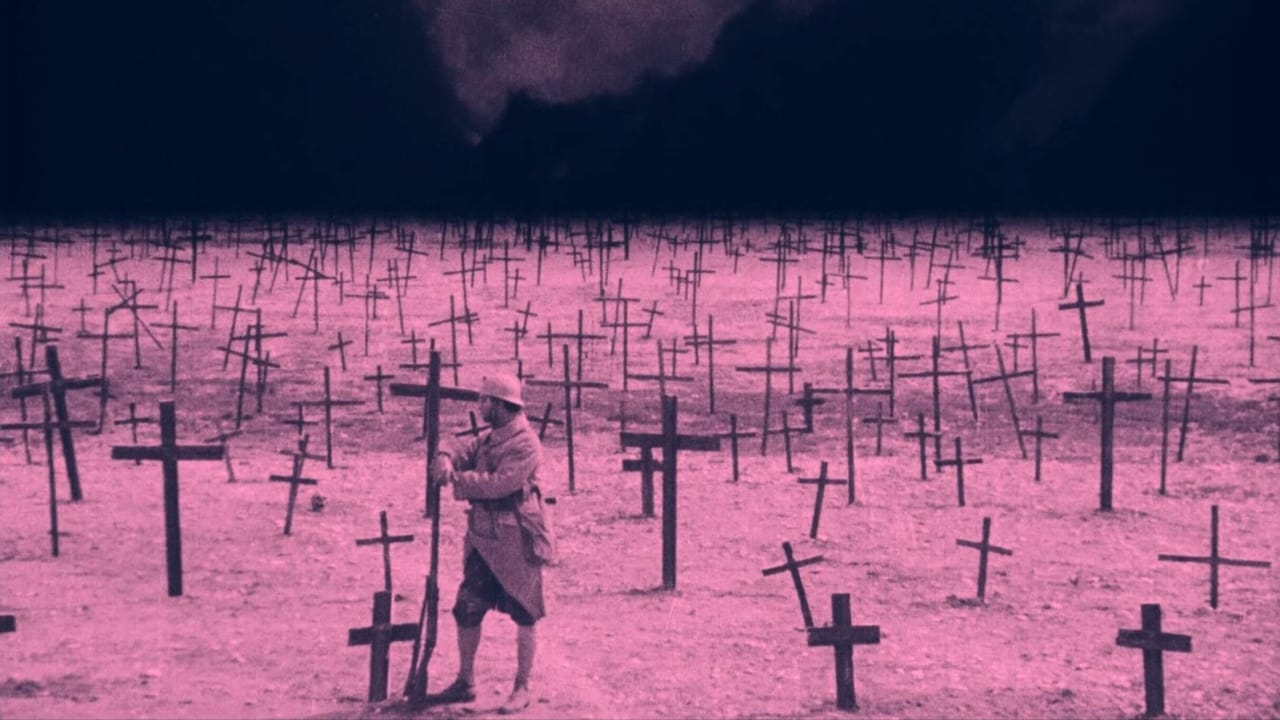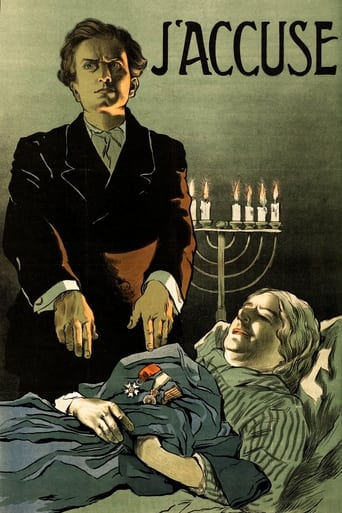Incannerax
What a waste of my time!!!
Konterr
Brilliant and touching
Twilightfa
Watch something else. There are very few redeeming qualities to this film.
Humaira Grant
It’s not bad or unwatchable but despite the amplitude of the spectacle, the end result is underwhelming.
Jamie Ward
A truly underrated gem if ever there was one, J'Accuse, which comes from now renowned film-maker Abel Gance, is a striking, powerful and deeply moving wartime drama that packs punches, dances with the roses and howls at the moon all in the course of 160 minutes. Now known for works that came in the decade following the first World War, Gance establishes himself here in 1919 as a director willing to learn from his peers and do one better. Indeed, audiences at the time were more than firmly on his side. "Your name in England is, at present, more famous than Griffith's", an anecdote that rings true after watching J'Accuse in its most readily complete form available today thanks to the brilliant work in collaboration by Flicker Alley, Turner Classic Movies and Lobster Films in doing a terrific job restoring the film to its rightful, stylised beauty on DVD and Blu-Ray.Set, produced and featuring actual footage shot on battlefields of World War I, Gance's seminal work here strives to do many things at once and while there are plenty who will argue he tries too much (or at least doesn't leave enough on the cutting room floor), I argue that with a few minor exceptions, J'Accuse is successful in its quest to marry poetry with war and terror with beauty, with a horizon that never seems to show itself. Sure, it's certainly guilty of being a bit overly-lofty at times. And yes, cutting back and forth between the film's two heavily-contrasted plots can be jarring, but I hardly think this was out of step with Gance's intentions. The film's theme essentially boils down to the blind getting in the way of each other and those lucky enough to have eyes thinking it best to ignore said unfortunates in order to get on with their own problems or indulgences in peace. By applying the juxtaposition of a serene, idyllic French countryside love-triangle against the harsh, cold grasp of war and death, the director sets up his idea, carries it forward and succeeds in bringing it to a very affecting close.I would be amiss in failing to mention two other key players in J'Accuse's success however, and those are cinematographer Léonce-Henri Burel and the Robert Israel Orchestra who were commissioned for the restoration's soundtrack. Burel takes Gance's direction and runs with it. The battlefields are gloomy and frightening, the French countryside bright and warm to the eyes. Furthermore, whether it was under Burel's direction or not is unclear but, the film's various intertitle designs and abstract live-action imagery (the most striking perhaps occurring early on when family members prepare to leave their loved ones) make a profound emotional impact and showcase tonal photography techniques and styles not even Griffith had dreamed up yet, much of which is still utilised today in movies favouring mood and atmosphere. Lastly, the Robert Israel Orchestra punctuate Burel's photography with melancholic sweeping piano keys and piercing, wounded strings to round out one of the finest and most striking examples of silent-era cinema at its best.
Ron in LA
The 2006 restoration of this amazing 1919 film presents one of the very best opportunities to learn about the period from watching a contemporaneous film. Aesthetically, it stands on its own merit as a completely engaging and emotional piece, which on the whole deserves a much wider audience. The restoration drops whatever there was of a phony happy ending in the 1922 re-release, and adds an excellent score by Robert Israel. Israel scores are a quick tip that a silent film has been given a sensitive and elegant restoration that will be very palatable to modern tastes.The story is a complex family/romantic melodrama built around a poet in love with a woman trapped in a bad marriage to a violent man. With the war, the two men become comrades in arms, and complications ensue. (I really dislike reviews that go on and on telling the film's story. If someone is going to watch the movie, it is up to the director to tell the story in his own style and at his own pace.) I believe the film is mischaracterized as an anti-war film. No one is really for war, so a realistic film like this by a veteran and using real footage will include a lot of pathos that will serve the purpose of an anti-war message. But everyone is anti-war, the difference between a pro-war and and an anti-war film is that a pro-war film blames the war on the enemy and creates situations for nobility based on service of the just cause. An anti-war film turns the proponents of war into greedy liars, emphasizes the humanity of the enemy, and creates situations for nobility based on refusal to participate in the war. So defined, this piece (like The Four Horseman of the Apocalypse - 1921) is a pro-war film.
Michael_Elliott
J'Accuse! (1919) *** (out of 4)The French masters 166-minute epic tells the story of two soldiers, Francois (Severin-Mars) and Jean (Romuald Joube), both in love with the same woman but she is married to the much older Francois but has an affair with Jean. This is very impressive film from French director Gance but I think it falls short compared to his two classic epics that would follow this one. I think this films biggest problem is its running time, which seems a tad bit too long especially a few of the talking scenes, which run on and on. On the technical side this film is nearly flawless with Gance taking the influence of Griffith and really pushing it to a new level. The most impressive thing in the film are the amazing war scenes, which are downright brilliant and they really make you feel as if you are a part of the action. The scenes with the men in the trenches contain some great atmosphere and the sense of dread runs throughout these scenes. The most famous sequence in the film, and in film history, is the "March of the Dead" sequence, which takes nearly twenty-minutes and comes towards the end of the movie. This is certainly one of the most eerie and haunting sequences in film history and the main reason this anti-war film is still remembered today. The way Gance points the finger at the folks who weren't in the war and either living it up having fun or making money off the war, comes off very creepy and the message is certainly right there on the screen. The effects used to show the dead walking are very well done and the atmosphere here is so thick that you'll feel as if you can feel them walking towards you. The performances are all very good with Mars and Joube really sticking out. As I said, I think the film runs a tad bit too long but this is still a very impressive film with one of the greatest sequences in film history.
writers_reign
With this movie full of stunning imagery and stylish technique Abel Gance proved that he need take a back seat to no one when it came to mastery of the medium, in other words he forms a triumvirate with Sergei Eisenstein and David Wark Griffith, a triumvirate in which all are equal. The First World War was barely cold in its grave when Gance shot J'Accuse - a motif that recurs throughout from the visually stunning message spelled out by infantry at the outset to the child being taught to write it on a blackboard - yet remarkably what should now seem 'dated' is still potent - seventeen years later Irwin Shaw (who may or may not have seen or been aware of J'Accuse) utilised the concept of the dead protesting at the way in which their lives were squandered in his powerful One-Act play 'Bury The Dead' - and aspects of it were re-worked by others. Like most fine social documents it employs a 'normal' story - in this case our old friend the Eternal Triangle - as a way in to the exploration of political inadequacies and its message still resonates some 87 years later. A Masterpiece.

